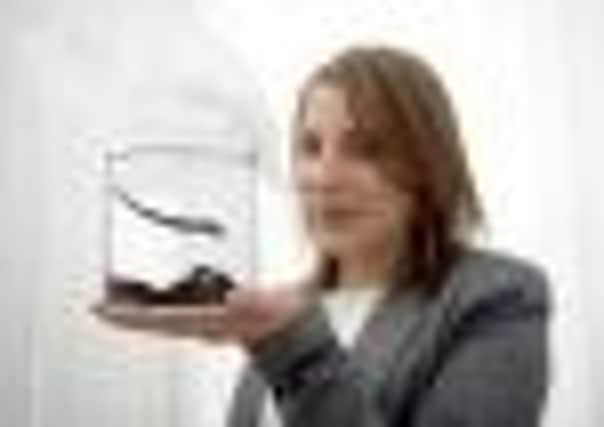Special clinic offers leech therapy associated with Middle Ages


But a style of healthcare usually associated with the Middle Ages is being offered for as little as £70 a time in Edinburgh at Scotland’s first leech clinic.
The self-styled “Dr Leech”, or “hirudotherapist”, behind the clinic is Katarzyna Tulin, a young woman who came to Edinburgh from her native Poland six years ago.
Advertisement
Hide AdAdvertisement
Hide AdShe has no medical qualifications and states on her website she has only “studied human anatomy” at home and attended a two-week course in her native Poland on the use of leeches on humans.
Doctors today warned precautions were needed against the risk of infection, but Ms Tulin insisted all leeches used are sterile and said they can ease the symptoms of everything from heart disease to piles.
She said she decided to specialise in the use of leeches after a friend was seriously injured in a car crash. While she was searching for treatments that she thought might help ease his recovery, a friend who had a clinic in Warsaw mentioned leech therapy. She travelled back to Poland to complete the course and has now opened the “clinic” in Montrose Terrace, just off London Road.
In the first few months of opening, the most common complaints she said she had seen were varicose veins, allergies and piles.
She said that, contrary to popular perception, blood-letting was not the main purpose of leech treatment. She said: “The main aspect is the leech’s saliva which contains hirudin that thins your blood, and that’s the main thing that helps. It can reduce blood clotting and improve your blood flow and regulation of the blood pressure.
“Even before I got hirudotherapy on myself I was scared, but it’s not painful. For the first 15 minutes it can feel like tiny electric injections, or mosquito bites. I wouldn’t call it pain, but you can feel them biting.”
She gets the leeches from a laboratory in Wales called Biopharm, and keeps them in sealed jars in a fridge, using each leech once only.
It costs £50 a session, plus £10 per leech, and at each consultation anything from two to ten leeches are attached to the body. They remain in place for about an hour before falling off when they are completely engorged.
Advertisement
Hide AdAdvertisement
Hide AdMs Tulin said: “It’s working with acupuncture points. There are significant places on the body which help to send saliva to the right places.
“For example, for headaches I would prefer to use the area behind the ears or on the back of the neck.
“For allergies, I would put them on the liver area, sinus problems the neck and the back of the ears as well, and maybe the chest.”
She said the procedure did not carry the risk of infection. “I think it is dangerous to put leeches on someone only if they don’t come from a sterile place and all my leeches are from a sterile laboratory,” she said. NHS Lothian was unable to comment.
‘You’d have to be absolutely bonkers’
WE use leeches from time to time. If you have a finger chopped off and we replant it, it involves microsurgery and joining tiny blood vessels together.
But often the arteries are better preserved than the veins and you can get venous congestion, where there is enough blood flowing in but not enough flowing out of the tissue and we need to encourage drainage. We put leeches on the finger that we’ve reattached to reduce congestion, and it puts an anticoagulant into the finger.
If we’re doing a breast resection or tummy flap, we very occasionally use leeches if there are difficulties with blood flow.
Because they secrete an anticoagulant, one of the drug companies did invest a lot of money in developing it as an anticoagulant, called hirudin, but it’s never been widely used in medical practice.
Advertisement
Hide AdAdvertisement
Hide AdWhenever we give a patient leeches, we always give them prophylactic antibiotics because of the risk of infection. I think you’d be absolutely bonkers to have treatment with leeches if you didn’t need it for medical reasons.